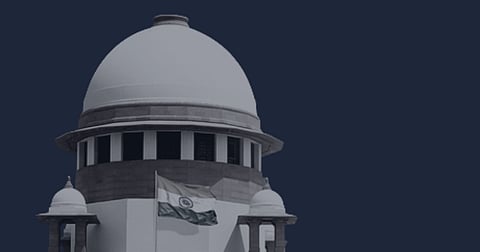

A public interest litigation (PIL) has been filed in the Supreme Court seeking directions to the union government, state governments and the Union Territories (UTs) to provide an in-frame sign language interpreter in all the official press briefings conducted by the Prime Minister, other ministers of the union government, Chief Ministers and other ministers of the state government, in accordance with the Rights of Persons with Disabilities Act, 2016.
The petition asserts that access to sign language is the basic human right of deaf people.
"For persons with hearing impairment, access to sign language is key to breaking down communication barriers and participating in society just like anyone else", the plea states.
Karpagam, the petitioner, who is a disability rights activist and also the first visually impaired woman advocate practicing at the Madras High Court, says she has been in touch with many differently-abled organizations and differently-abled people, especially the hearing-impaired. Many of the hearing-impaired have expressed difficulty in understanding the news briefings conducted by the Prime Minister of India, Chief Ministers of the various states in India and other Ministers , which has constrained her to file the PIL.
In her plea, filed through Advocate-on-Record Nupur Kumar, Karpagam has argued that sign language is the bridge that connects the rest of the world with those who have an impaired hearing or verbal disability. An array of gestures made using hands, fingers, arms, head and facial expressions, besides symbols, constitute sign language.
The plea argues that the press briefings are important meetings held by the Heads of the State like the Prime Minister, the President and the other Ministers, including the Chief Ministers of the states, to appraise the public at large about the various developments in the government, initiatives, new schemes and projects for the people, and other information of public interest.
"However, all the press briefings held in India are neither inclusive nor accessible", the plea states.
The petition relies on the United Nations Convention on the Rights of Persons with Disabilities, 2006, Article 9 of which provides for the accessibility of information and technology to persons with disabilities. Articles 21 and 24 also mention sign language in their provisions.
The petitioner draws the Court's attention to Section 2(f) of the Rights of Persons with Disabilities Act, which defines communication to include signs as follows:
""[C]ommunication" includes means and formats of communication, languages, display of text, Braille, tactile communication, signs, large print, accessible multimedia, written, audio, video, visual displays, sign language, plain-language, human-reader, augmentative and alternative modes and accessible information and communication technology".
Besides, Section 42 of the same Act casts a duty on the appropriate government, that is, the union and/or the state government, to provide facilities, including sign language interpreters, for persons with hearing and speech impairment to make information and communication accessible to this section of people.
"The 2016 Act unequivocally prohibits discrimination against individuals with disabilities, which includes failing to provide meaningful access to public benefits, programs, or services", the plea contends.
It argues that substantial equality for persons with disabilities can be achieved if the appropriate government takes steps to provide "reasonable accommodation" as provided in Section 2(y) of the 2016 Act to mean "necessary and appropriate modification and adjustments, without imposing a disproportionate or undue burden in a particular case, to ensure to persons with disabilities the enjoyment or exercise of rights equally with others".
The petition highlights that during national/state emergencies and natural disasters, among other things, crucial information relating to public benefit schemes, helplines and so on are communicated by the governments via press briefings.
"The absence of sign language interpreters in such situations impedes the access of the hearing-impaired to a government program or benefit, thereby rendering them to be treated in an inequitable manner and establishing their lack of meaningful access to such programs and/or benefits", the plea contends.